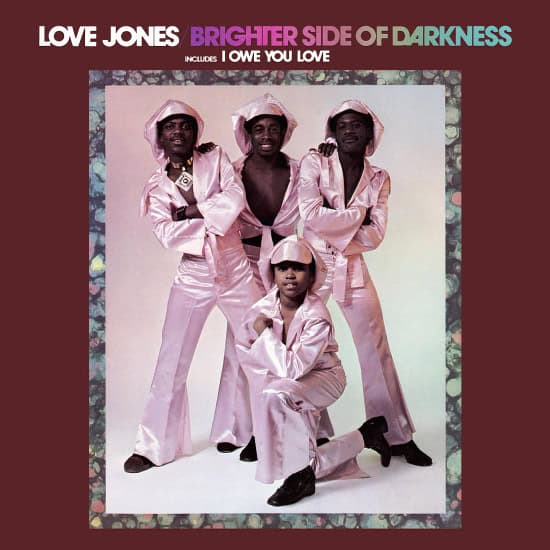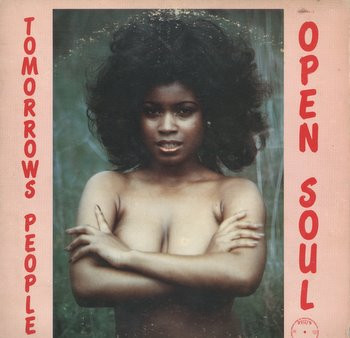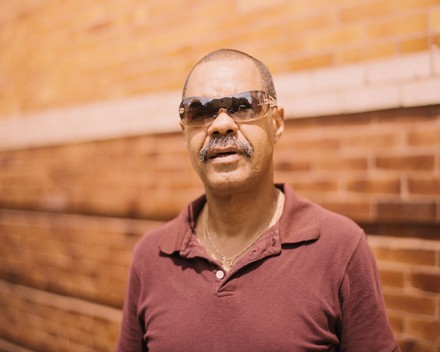
In a heartfelt interview with Bob Abrahamian on WHPK 88.5 FM, Randolph Murph, lead vocalist of The Brighter Side of Darkness, recounts the group’s journey from Chicago’s South Side to national fame with the hit single Love Jones. Formed in the early 1970s at Calumet High School, the group captured audiences with their harmonies and smooth, soul-stirring style. Inspired by groups like the Temptations and the O’Jays, they recorded Love Jones in 1973, a track that became a pioneering influence in blending spoken-word monologues with soul music. Murph reflects on the challenges and joys of their journey, from performing at the Apollo Theater to the guidance received from icons like Smokey Robinson. Though the group disbanded in the late 1970s, Murph’s passion for music continues as he pursues gospel, creating a legacy that bridges soul and faith.
Bob Abrahamian 00:00
Okay, you are tuned to WHPK 88.5 FM in Chicago. You are listening to Sitting in the Park. Today, it's going to be a special show because I'm doing an interview with one of the lead singers and spokespersons for the Brighter Side of Darkness. Do you want to introduce yourself?
Randolph Murph 00:23
My name is Randolph Murph.
Bob Abrahamian 00:26
So, at least from the start of the show, we’ll be talking about the history of the Brighter Side of Darkness and playing their records. So you should definitely keep tuned. First of all, thanks so much for coming down to the studio.
Randolph Murph 00:39
Thank you, my pleasure.
Bob Abrahamian 00:41
Can you talk about, first of all, what part of Chicago the Brighter Side of Darkness is from?
Randolph Murph 00:46
We're from the South Side of Chicago.
Bob Abrahamian 00:48
Okay. Are you all from the same neighborhood?
Randolph Murph 00:51
We were basically from the same neighborhood.
Bob Abrahamian 00:53
What blocks are you guys from?
Randolph Murph 00:55
We grew up around Calumet High School. Three of us went to Calumet High School, so we basically lived from, I’d say, around 79th to 81st Street.
Bob Abrahamian 01:08
And was this the first group that everyone was in, or did any of you sing before that?
Randolph Murph 01:18
I just sang a little gospel before that.
Bob Abrahamian 01:20
So is that how you got started singing—just in church?
Randolph Murph 01:23
Yes, that's correct. I started out in church.
Bob Abrahamian 01:26
And how did the group form? Who put it together?
Randolph Murph 01:31
Well, three of us were attending Calumet High School here in Chicago—me, Ralph Eskridge, and July Washington. We used to sing in the hallways and sounded pretty good together. One day, a guy told us about a lady looking for some singers to sing with her son, Darryl Lamont. He was younger than us, still in grammar school. We went over to Darryl's house one evening, met his mother, and that’s how we got started.
Bob Abrahamian 02:07
Do you remember what grade you were in at the time?
Randolph Murph 02:13
I was a junior.
Bob Abrahamian 02:15
So, you were all juniors, and Darryl was in the eighth grade?
Randolph Murph 02:21
Yes, he was about three or four years younger than us.
Bob Abrahamian 02:24
How did you hear about him and his mother?
Randolph Murph 02:32
A friend mentioned it to us, saying Darryl had a remarkable voice, and his mother was looking for people to sing with him—some background singers. So we went to meet them, and it was just magic from there.
Bob Abrahamian 02:59
You pretty much instantly started harmonizing with him?
Randolph Murph 03:03
Yes, everything fell right into place.
Bob Abrahamian 03:04
What year was that?
Randolph Murph 03:07
I’d say it was around 1972.
Bob Abrahamian 03:10
So, you recorded soon after that?
Randolph Murph 03:15
Yes, we might have been together for about a year before we recorded.
Bob Abrahamian 03:20
And did Darryl live near you guys?
Randolph Murph 03:24
Not too far—about 15 or 20 minutes away.
Bob Abrahamian 03:30
When you started singing together, did you already have a name for the group?
Randolph Murph 03:38
Our manager helped come up with the name, along with a guy named Frank Dudley.
Bob Abrahamian 03:45
Who was your manager?
Randolph Murph 03:52
Darryl’s mother, and she managed us at the beginning.
Bob Abrahamian 03:54
So, initially, did you guys do talent shows, or did you get a contract quickly?
Randolph Murph 04:03
We did a few talent shows around the city, and people started calling us the best group in town. We thought we could sing as well as groups like the O’Jays and the Dramatics, so we decided to try recording a hit. Ralph and I wrote Love Jones together.
Bob Abrahamian 04:34
You mentioned the O’Jays and Dramatics—were they some of your inspirations?
Randolph Murph 04:41
Yes, but my favorite group was the Temptations. I also liked the Stylistics.
Bob Abrahamian 04:50
You and Ralph wrote Love Jones before you had a recording deal. How did you come up with the phrase “Love Jones”?
Randolph Murph 05:18
It just came to me. People would say “Jones” to mean something they really wanted, so I thought of a “Love Jones.”
Bob Abrahamian 05:30
How did you end up getting a recording contract and recording the song?
Randolph Murph 05:47
During the holidays in early 1973, we performed at Herschel’s Fireside Supper Club. Clarence Johnson, who produced our song, was in the audience. After the show, he introduced himself and a week or two later, we were in the studio recording.
Bob Abrahamian 06:18
So, you performed Love Jones before you recorded it?
Randolph Murph 06:29
Yes, we performed it live that night. Clarence added the strings and horns in the studio.
Bob Abrahamian 06:44
Did the song change much after he produced it?
Randolph Murph 06:44
Not really, just some minor adjustments, like adding a third verse. It was pretty much the same.
Bob Abrahamian 07:16
You had a band, the 25th Hour. Did they also go to Calumet High School?
Randolph Murph 07:23
One of them did, but we mostly met them through our manager.
Bob Abrahamian 07:29
Let me play Love Jones so the audience knows what we’re talking about. This is the Brighter Side of Darkness with Love Jones.
[music playing]
Bob Abrahamian 12:09
Okay, that was the Brighter Side of Darkness with their big hit from 1973, Love Jones. If you're just tuning in, I have Randolph Murph in the studio, a member of the Brighter Side of Darkness and one of the writers of that song. And you actually do the monologue on that track, right? The "test paper with nothing but my name on it" part. How old were you when you wrote that?
Randolph Murph 12:36
I was about 17.
Bob Abrahamian 12:37
That's pretty smooth for one of the first rap-like monologues. So, Clarence Johnson saw you guys perform this live at a New Year's Eve show, but Darryl was still in eighth grade. Was he able to do shows like that?
Randolph Murph 12:58
He could perform, but he couldn’t mingle with the crowd. He’d just wait in the dressing room until it was time to go on stage.
Bob Abrahamian 13:03
So, Clarence saw you on New Year's Eve, and you recorded a few weeks later. Did you sign a contract with Clarence or with your manager?
Randolph Murph 13:14
We signed with General Entertainment Corporation, which was Clarence's production company. He took Love Jones to a record convention in California, and 20th Century Fox had just started their record division. Out of over 2,000 songs at the convention, Love Jones was the only one they signed.
Bob Abrahamian 13:38
Was the song finished when it went to the convention, or did they do more with it after signing?
Randolph Murph 13:47
It was pretty much done. 20th Century just put their label on it and distributed it.
Bob Abrahamian 13:55
Clarence added all the horns and strings in the production, right?
Randolph Murph 14:14
Yes, he produced everything. Clarence was remarkable and really helped shape the song.
Bob Abrahamian 14:19
Did you record an entire album at once, or did you go back to the studio after Love Jones became a hit?
Randolph Murph 14:32
We went back a couple more times to finish the album.
Bob Abrahamian 14:35
So, Darryl sings lead on Love Jones. The song became a huge national hit. What happened after it was released? Did you start touring nationally?
Randolph Murph 14:48
Yes, we toured a lot. We performed with some of the biggest names in the business, and we built a strong reputation for our live shows.
Bob Abrahamian 14:59
What was your live show like?
Randolph Murph 15:03
It was fantastic! A lot of excitement and energy—we’d get standing ovations. We did a mix of our songs and covers of popular hits by groups like the O'Jays and Dramatics.
Bob Abrahamian 15:35
On the album cover, you have these silver suits. Did you perform in those, or was that just for the photo shoot?
Randolph Murph 15:45
Oh, we performed in those, too.
Bob Abrahamian 15:47
Where did you tour after Love Jones became a hit?
Randolph Murph 15:52
We went all over the country. You name it, we were there.
Bob Abrahamian 15:57
And you were on Soul Train, right?
Randolph Murph 16:08
Yes, we were on Soul Train in early 1974.
Bob Abrahamian 16:10
Did you perform Love Jones on Soul Train?
Randolph Murph 16:31
Yes, we did.
Bob Abrahamian 16:31
I've never seen that footage. It would be cool to see, but I know Don Cornelius keeps it under lock and key. After Love Jones, you released a few other singles. Did they get much airplay?
Randolph Murph 16:43
Yes, songs like I Owe You Love and Just a Little Bit got good airplay. A lot of people really liked Summer Ride and I'm the Guy from the album.
Bob Abrahamian 17:36
Do you remember performing I'm the Guy live? I heard that song was the flip side of Love Jones on the single.
Randolph Murph 17:45
Yes, but we didn't originally have choreography for it. When we were asked to perform it on a TV show in New York, we made up a routine in the dressing room just before going on.
Bob Abrahamian 17:54
What TV show was that?
Randolph Murph 18:40
I think it was on WKT, but I’m not sure about the exact show.
Bob Abrahamian 18:40
Well, let me play I'm the Guy so people can hear it. Here’s the Brighter Side of Darkness with I'm the Guy.
[music playing]
Bob Abrahamian 25:05
That was just the Brighter Side of Darkness with Just a Little Bit, and before that, we heard I'm the Guy. If you're just tuning in, I have Randolph Murph here, a member of the Brighter Side of Darkness. He sings the lead on I'm the Guy. Who sings lead on Just a Little Bit?
Randolph Murph 25:57
Ralph and Darryl sing lead on that one.
Bob Abrahamian 26:03
Do you have any memorable stories from touring after Love Jones became a hit?
Randolph Murph 26:06
One of my favorite memories is performing at the Apollo Theater. We got a standing ovation, and we met Smokey Robinson and James Brown. Smokey gave us some good advice: "No matter what, stay together." I wish I’d listened.
Bob Abrahamian 26:36
You cut three singles for 20th Century, and then a fourth came out on Clarence Johnson’s Star View label. Then there was a gap until your last single on Magic Touch in 1978. What happened?
Randolph Murph 27:07
We did a lot of live shows and traveled a lot, but we faced some management and corporate issues, like many groups do. We were young and didn’t have much industry experience, which made it tough.
Bob Abrahamian 27:25
By then, were you all out of school and doing music full-time?
Randolph Murph 27:35
Yes, we were.
Bob Abrahamian 27:36
Tell me about your last single, He Made You Mine, which came out in 1978 on Magic Touch. Was it the same group lineup?
Randolph Murph 28:20
Yes, it was the same lineup. But honestly, by that time, we were having challenges. Darryl’s mother had managed us as far as she could, but we needed someone else to take the group to the next level. We had some opportunities turned down that would have helped us grow.
Bob Abrahamian 29:18
You mean, like the William Morris Agency?
Randolph Murph 29:33
Yes, they were interested in representing us, and they were big in the industry, handling stars like Sammy Davis Jr. and Frank Sinatra. But we were advised against it so that our existing team could maintain control, which I think held us back.
Bob Abrahamian 30:06
Well, let me play He Made You Mine. Here’s the Brighter Side of Darkness with He Made You Mine.
[music playing]
Bob Abrahamian 34:39
You're tuned to WHPK 88.5 FM in Chicago. That was the Brighter Side of Darkness with their last record, He Made You Mine, from 1978. Randolph, was that the last time the original group sang together?
Randolph Murph 35:23
Yes, we didn’t stay together much longer after that.
Bob Abrahamian 35:27
Did any of you pursue music after that?
Randolph Murph 35:30
A little here and there, but nothing major. I did some solo work.
Bob Abrahamian 35:40
And what are you up to now?
Randolph Murph 35:40
I’ve dedicated my life to Christ and am serious about my salvation. I want to sing gospel music and have started my own publishing company. I’m also establishing a production and management corporation called Raw Blood Music.
Bob Abrahamian 36:03
Are you planning to produce gospel and R&B music?
Randolph Murph 36:08
Yes, I plan to produce both genres.
Bob Abrahamian 36:10
Do you have any artists lined up yet?
Randolph Murph 36:13
I have a few things in the works and some acts I’m interested in, but I’m waiting to finalize everything.
Bob Abrahamian 36:21
Thanks so much for coming to the studio and sharing your story. Any last words for the audience?
Randolph Murph 36:30
Just, hey, keep it real.
Bob Abrahamian 36:34
Thank you. The last record I’m going to play is an excellent album cut by the Brighter Side of Darkness called I'm a Loser.
[music playing]
Bob Abrahamian 39:57
That was the Brighter Side of Darkness with I'm a Loser. Randolph, you wanted to share one more thing with the audience.
Randolph Murph 40:07
Yes, for any new talent or anyone who wants to reach me, I can be contacted at REDACTED. God bless, and thank you for listening.
Bob Abrahamian 40:25
Thank you so much, Randolph.

